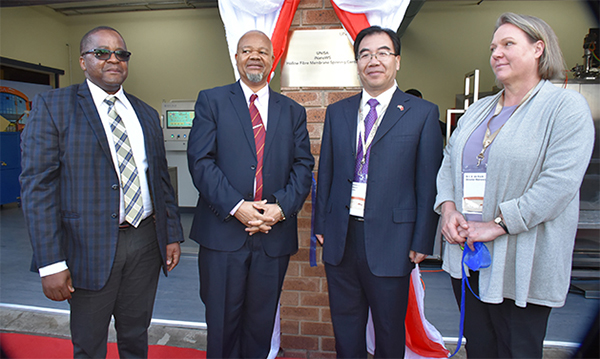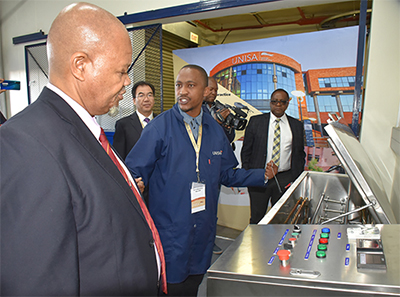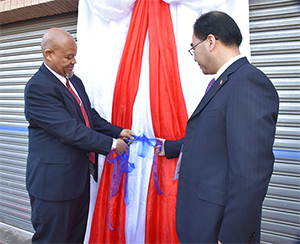
On Thursday 28 August 2019, Unisa’s College of Science, Engineering and Technology launched the state of-the-art iNanoWS Hollow Fibre Membrane Spinning System at the Unisa Science Campus.

Prof Bhekie Mamba, Executive Dean, College of Science, Engineering and Technology; Prof Mandla Makhanya, Unisa Principal and Vice-Chancellor; Prof Jianxin Li, Director for the National Centre for International Joint Research on Membrane Science & Technology, Tianjin Polytechnic University; and Dr Lueta de Kock, Director of the Nanotechnology and Water Sustainability (NanoWS) research unit.
Hollow fibre membranes are tubular devices used as filters to purify water and wastewater. A variety of other water and water treatment technologies are currently used by water treatment companies, but few offer the advantages of hollow fibre membranes. This is because inside a hollow fibre membrane water filter, hundreds or even thousands of tubes, which look like minute straws, are bundled together in a matrix fashion. The walls of these hollow fibres contain numerous tiny micropores. When water or wastewater passes through these tiny micropores, any pollutant, whether chemical or microbiological, is trapped inside the tubes because it is too big to pass through the pores (size exclusion principle). The water on the other side is clean.

Kagiso Molokane, a lab technician from NanoWS, doing a demonstration for Prof Makhanya and delegates.
These devices are attractive for use in water and wastewater purification and treatment, because they sieve out contaminants efficiently and more effectively using physical rather than chemical means. They are capable of purifying water at all pH, salinity, turbidity and temperature levels. Other technologies, such as those that use ultraviolet light and chemical treatments, are highly dependent on physical properties and water chemistry, adsorption or chemical degradative principles. These tamper to a certain degree with water quality or their performance is affected by the state of water chemistry.
"Obtaining these machines to make hollow fibre membranes will enable Unisa to offer advanced training on membrane technology relevant to water and wastewater treatment and thus generate highly skilled graduates who will serve the communities better. Moreover, it will enable Unisa to embark on offering solutions to water quality challenges. This is because Unisa will be able to produce these devices locally on a large scale and supply them to water and wastewater treatment plants," said Prof Bhekie Mamba, Executive Dean of CSET.
"Research in the development of water purification technologies has been among the areas where Unisa is investing its resources and priorities. For this reason, Unisa has been in the forefront among its peers globally in developing appropriate and relevant technologies that are affordable and relevant to our communities in our country and in the region. As we speak, laboratories at Unisa’s Science Campus are well equipped with state-of-the-art, top of the range research facilities that enable researchers to engage in high quality research in almost all fields including the area of water quality," said Prof Mandla Makhanya, Unisa Principal and Vice-Chancellor (VC).

Prof Mandla Makhanya, Unisa Principal and Vice-Chancellor, cutting the ribbon with Prof Jianxin Li, Director for National Centre for International Joint Research on Membrane Science & Technology from Tianjin Polytechnic University.
The VC further mentioned that the Hollow Fibre Membrane Spinning Facility adds to Unisa’s inventory of such sophisticated platforms to ensure that we are best equipped to address problems associated with water quality in a more sustainable way. "For example, the plants we are launching will enable the production of hollow fibre membranes at an industrial scale and in an economical way," he said. "Unisa will therefore be in a position to offer training in advanced water treatment training and also work closely with relevant water sectors in the country, such as water and wastewater treatment authorities, municipalities and other stakeholders in the water sector with a view to addressing problems associated with water quality in a more holistic and sustainable way. "I would also like to capture the opportunities from the new era of partnerships as it is imperative that the academia and industry work closely together to access, develop and deploy new sustainable technologies for water quality that are relevant to our own communities and society. I encourage all of us that we work together to adopt an open mindset and tap on the relevant technological solutions that will make an ordinary citizen realize the dream of having safe and clean water for all as it is stipulated in sustainable development goals number six."
The process of procuring this system started in mid-2016 when Unisa needed to conduct cutting-edge research on the development of water purification and treatment technologies that address water quality challenges in a sustainable way and at an industrial scale. In this process, it was concluded that it was necessary to acquire hollow fibre membrane spinning plants.
The process of searching for a manufacturer/supplier was carefully considered to ensure that we get a facility that is suitable based on the needs and requirements of our research objectives. The manufacturer and Unisa then worked together to get the design and configuration of a system that is most appropriate, which will be suitable and desirable for the needs and objectives of our research, and for addressing the needs of our society in South Africa. The design and configuration of the system was agreed between the two parties and the process to construct the system started. In June this year, 2019, the plants were ready and they were shipped to South Africa, specifically to the Durban Harbour. After clearing all the necessary procedures, the system was delivered to the Unisa Science Campus for installation.
* By Thembeka Ntuli Mpapama, Communication and Marketing Specialist, College of Science, Engineering and Technology
Publish date: 2019-09-10 00:00:00.0